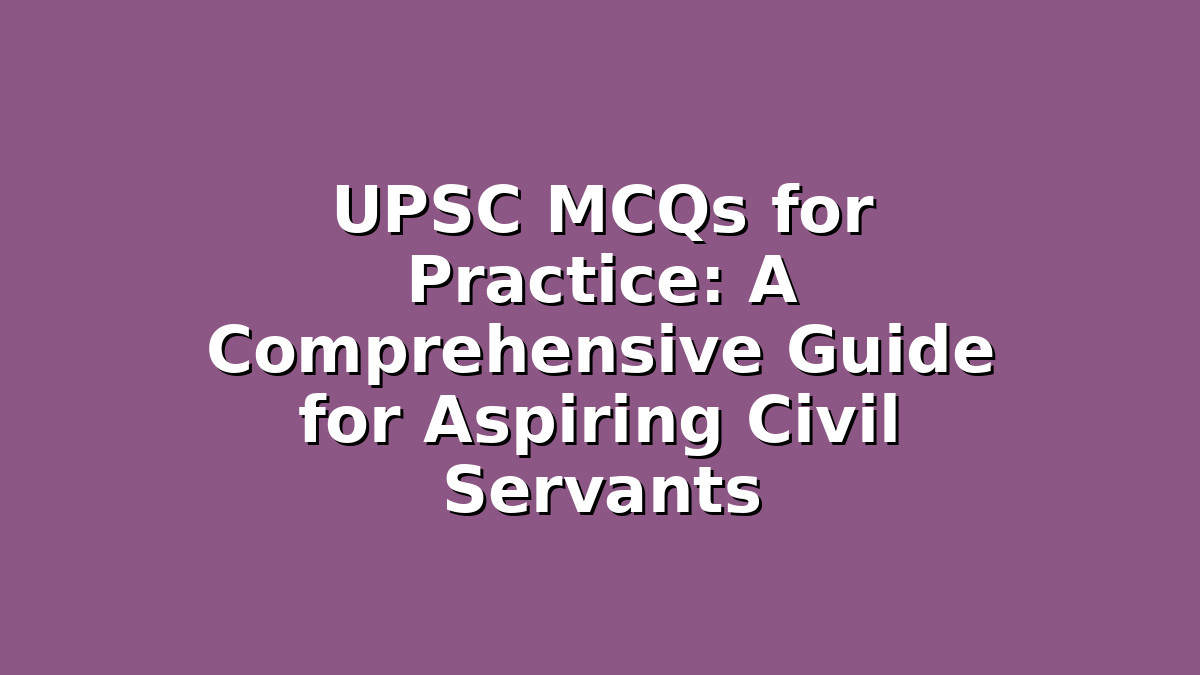Preparing for the UPSC (Union Public Service Commission) exam is one of the most challenging yet rewarding journeys for many students in India. The exam not only tests your knowledge across a wide range of subjects but also evaluates your analytical abilities, problem-solving skills, and overall aptitude. One of the most effective ways to prepare for UPSC is through regular practice using Multiple Choice Questions (MCQs). This blog article will guide you on how to use UPSC MCQs for practice effectively, helping you maximize your preparation and boost your confidence.
Why Practice UPSC MCQs?
The UPSC Civil Services Examination covers prelims, mains, and interview stages, with the preliminary exam consisting primarily of objective-type questions. Practicing MCQs regularly offers multiple benefits:
– Familiarity with Exam Pattern: MCQs help you get acquainted with the style and difficulty level of the questions.
– Time Management: Practicing under timed conditions improves speed and accuracy.
– Knowledge Reinforcement: Answering questions repeatedly strengthens your understanding of key concepts.
– Self-Assessment: MCQs help you identify your weak areas and allow you to focus your efforts accordingly.
In the sections below, we will discuss three important strategies to effectively use UPSC MCQs in your study routine.
—
1. Integrate MCQs into Your Daily Study Routine
Consistency is key when preparing for a competitive exam like UPSC. Instead of viewing MCQ practice as a separate activity, integrate it into your daily study schedule. Here’s how you can do that:
– Subject-Wise MCQ Practice: After studying a particular topic or subject, attempt relevant MCQs to test your understanding immediately. For example, if you finish reading the Indian Polity chapter, try solving MCQs related to that chapter on the same day.
– Set Daily Targets: Aim to solve a fixed number of MCQs daily — for example, 30 to 50 questions depending on your schedule. This habit will gradually build your speed and confidence.
– Use Quality Question Banks: Invest in reputable UPSC MCQ question banks and online platforms that provide accurate, updated questions aligned with the UPSC syllabus.
– Review Your Answers: Always analyze your mistakes carefully. Understanding why an answer was wrong is far more important than just knowing the right answer. This deepens your conceptual clarity.
By embedding MCQs into your daily routine, you ensure continuous revision and reduce last-minute exam stress.
—
2. Simulate Real Exam Conditions with Timed Practice Tests
One of the biggest challenges in the UPSC prelims is managing time efficiently. The exam consists of 100 questions each in General Studies Paper-I and CSAT Paper-II, to be answered in two hours. Practicing under exam-like conditions can dramatically improve your performance.
– Take Full-Length Mock Tests: Schedule regular full-length preliminary exam mock tests. This helps you build stamina and adapt to the pressure of answering questions within a set time limit.
– Practice Time-Bound Sections: Divide your practice time to simulate real exam sections. For example, allot 60 minutes for 50 questions to simulate half the paper. Gradually reduce time as you improve.
– Analyze Test Results Thoroughly: Post-test, spend time going through each question you got wrong or guessed. Learn from your mistakes and revisit those topics.
– Develop Exam Strategies: Use these timed sessions to experiment with different approaches, such as answering easier questions first or skipping difficult ones to manage time better.
Timed MCQ practice not only enhances your speed and accuracy but also boosts your confidence, ensuring you stay calm on the actual exam day.
—
3. Use MCQs as a Tool for Conceptual Clarity and Revision
While MCQs are often seen as a means to practice for prelims, they can also be used effectively to deepen your conceptual understanding and aid revision.
– Conceptual Learning: When you encounter a difficult question, take the time to understand the underlying concept rather than just memorizing the answer. This approach is crucial for UPSC, where conceptual clarity often makes the difference.
– Create Your Own MCQs: After studying a topic, try crafting your own questions. This exercise forces you to think critically about the material and reinforces retention.
– Group Study Sessions with MCQs: Discussing MCQs with peers can illuminate different perspectives and explanations. Sometimes, group discussions can clarify doubts and help you remember facts more vividly.
– Use Online Quizzes and Apps: Many websites and apps offer daily quizzes on UPSC topics. Engage with these platforms regularly for quick revisions.
By approaching MCQs as more than just a test of recall—with a focus on understanding and revision—you’ll build a stronger foundation for both prelims and mains.
—
Conclusion
Preparing for the UPSC exam can seem overwhelming, but with the right strategies, you can simplify your journey and improve your chances of success. UPSC MCQs are a powerful tool that can enhance your preparation when used correctly. Integrate MCQ practice into your daily study routine, simulate real exam conditions with timed tests, and use MCQs as a tool for conceptual clarity and revision.
Remember, consistent practice, self-analysis, and a positive mindset are your greatest assets. Stay motivated, keep practicing, and trust the process. Your hard work will pay off, bringing you closer to your dream of becoming a civil servant.
Good luck with your UPSC preparation!

Responses